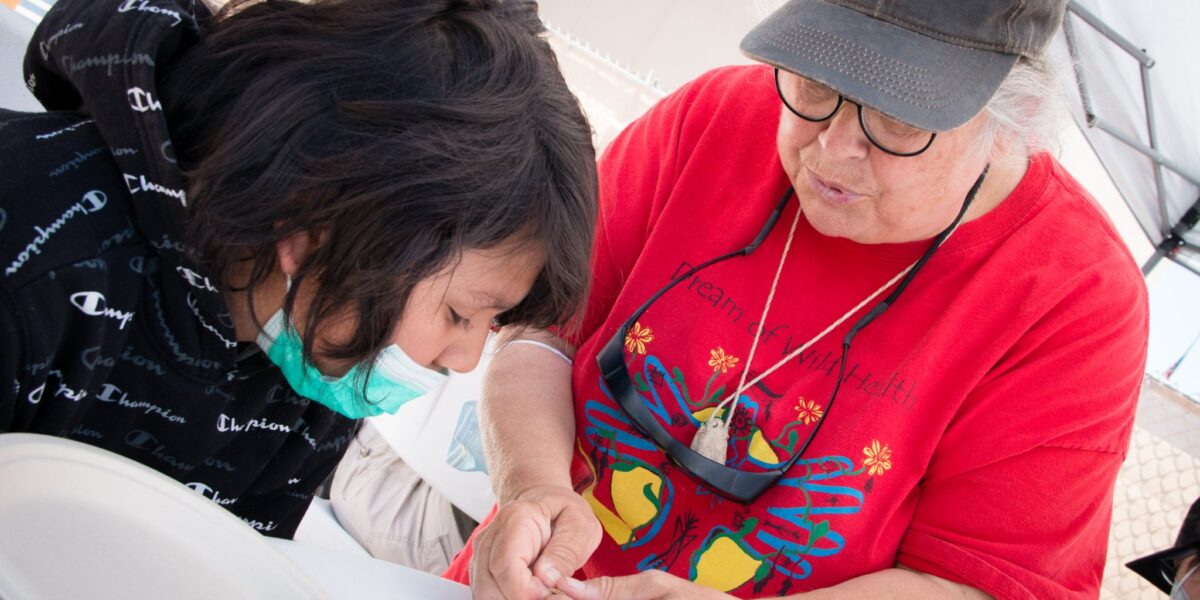This week, Emma Needham talks with story-keeper Hope Flanagan about why stories are essential to keeping native knowledge, culture, and language alive.
Winter is the time for storytelling for many Indigenous tribes in North America; In other seasons, people would be busy growing, harvesting, hunting, and preparing for the winter months. The cold, quiet time indoors offers an ideal time to entertain and educate children in communities.
Hope Flanagan is a storyteller, or story keeper, at Dream of Wild Health. She works with children, and the community to make sure that the stories are kept alive.
“So much of the culture is deep in the stories. And the stories can be very, very old. Some of the stories talk about when the snow was on the ground all year round. So I’m thinking we’re talking about back when the glaciers were around…And it’s all about a way of being on the earth that’s in respect with the earth, and each other, and the plants and the animals,” Hope said.
Stories are told during winter for many reasons. In some cases, it’s to show respect to animal relatives by waiting until they are in hibernation before talking about them in stories.
In other stories, influential spirit relatives may hear a call and come at the wrong time, so storytellers must wait until snow covers the earth to talk about them. Hope says it’s an important responsibility to care for the stories.
“It’s not something where you go like, Oh, look at me, like, No, this is a responsibility that you carry that you don’t put it down until you’re ready to pass it on. And then you make sure it’s somebody who can carry it and know the value of it. I mean, there honestly, in this society, people kind of get turned around with value is all about money. But value is nothing about money. Value is how you are in relationship with each other and with the earth or with food and how do you honor each other? How do you treat each other?” Hope said.
Hope Flanagan has spent the last 15 years working at Dream of Wild Health. Dream of Wild Health is a native-led non-profit focused on restoring health in the Native community by recovering knowledge of healthy Indigenous foods, medicines, and culture. They also work to provide access to this knowledge. During the 2022 growing season, they distributed 12.25 tons of food to the Twin Cities Native community. Hope shares how she came to her place as a storyteller there.
“Years ago, I was really struggling with health issues. And a friend of mine from Red Lake invited me to come to an opening of Anishinabeg Academy, and I went there, and I felt really good there. And my health felt good there. And I talked to the principal and he said, Well, we have a job opening for a storyteller. And I said, Well, I’m not a storyteller. I’m not Ona Kingbird and he said, ‘You don’t have to be Ona Kingbird. You go pick up Ona Kingbird and bring her here and have her teach the young ones.’ So that’s what I did for six years,” said Hope.
Dream of Wild Health works with soil revival and revival of traditional seeds, food production, traditional medicine, wild rice harvesting, and traditional knowledge sharing. As their storyteller Hope Flanagan shares, everything is alive and connected, including stories.
“Because the way you see the world is in what’s alive and what’s not alive. So in the stories, you really see that it really shows up, because when you start talking about these, what they call Aadizookaanag, Those are the legends that bring in the really important powerful beings that are talked about in the stories. Aadizookaanag can also be the stories themselves. So those are considered to be alive. And you have to treat them like they’re alive,” She said.
Hope Flanagan cares for all of the stories she tells, including planning for their future and through stories, Hope Flanagan reminds us to be humble and to remember our place in the world as human beings.
“I’m really humbled and grateful that some of these, these teachings were passed on to me and I know I don’t own any of this…We’re responsible for how we interact with them, so it’s our job to do the best we can to be respectful to our relatives. And when you hear that Niiji-bimaadiziik, or (my) fellow living beings, that’s all of those living beings, not just the human ones” Hope said.
Dream of Wild Health is celebrating its 25th year in operation in the Twin Cities. You can find out more about their work and connect with Hope Flanagan about stories on their website and social media.
For Minnesota Native News, I’m Emma Needham.
Subscribe to Minnesota Native News in your favorite podcast app
- The Sugarbush Tradition Continues in Minnesota’s Urban Areas, and Khayman Goodsky’s New FilmANCHOR Marie Rock: This is Minnesota Native News, I’m Marie Rock. This week, we hear about Minnesotans continuing the old tradition of sugarbush in urban areas. Plus, a look at …
- Sherburne National Wildlife Refuge Faces Staffing Cuts; Headlines Affecting Indigenous MinnesotansANCHOR Marie Rock: This is Minnesota Native News, I’m Marie Rock. This week, we hear about the impact of recent federal staffing cuts on Zimmerman, Minnesota’s Sherburne National Wildlife Refuge. …


 Minnesota Launches COVID19 Telehealth Program
Minnesota Launches COVID19 Telehealth Program